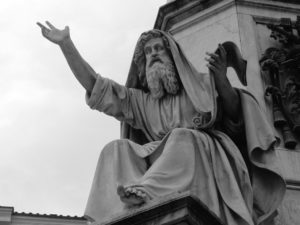Who are the prophets? The word prophet comes from the Greek noun prophetes from the verbal root pro-phemi, which means “to speak on behalf of/before/for someone.” A prophet of God thus speaks on behalf of God and communicates God’s message. Prophets are therefore filled with the spirit of God and they speak with God’s authority. For example, the prophet Micah speaks of himself: “But as for me, I am filled with power, with the spirit of the Lord, and with justice and might, to declare to Jacob his transgression and to Israel his sin” (Micah 3:8). The prophets revealed God’s radical concern for social justice and righteousness and the integrity of the universe (e.g., Hosea 12:6; Amos 5:15, 26; Isa 10:14; 11:9; 14:7). Just as God is passionately concerned about and deeply affected by the suffering of the poor and needy, prophets spoke for the powerless and oppressed with passion and integrity (e.g., Amos 2:7; 5:11; 8:4-6). They experience a dynamic energy from within to communicate God’s message with conviction and commitment. Prophets are men and women on fire. For example, Jeremiah speaks of his inability to be silent: “If I say, ‘I will not mention him, or speak any more in his name,’ then within me there is something like a burning fire shut up in my bones; I am weary with holding it in, and I cannot” (Jer 20:9).

The mission of the prophets was to remind the people of Israel of their covenantal relationship with God and to restore their status as God’s consecrated people whenever they failed to remain faithful to God. Prophets brought the challenges of God into the history of Israel, generating a powerful movement of renewal and social reforms. In the words of Walter Brueggemann, “the task of prophetic ministry is to nurture, nourish, and evoke a consciousness and perception alternative to the consciousness and perception of the dominant culture around us.” The mission of the prophets was to restore Israel to God by condemning idolatry, social injustice and exploitation of the poor and the marginalized (Isa 58:6-7; Jer 2:20-28; 22:13; Hosea 10:13; Amos 2:6-9). Prophet Jeremiah describes Israel as a lost sheep: “My people have been lost sheep; their shepherds have led them astray, turning them away on the mountains; from mountain to hill they have gone, they have forgotten their fold” (NRSV: 50:6). The passion to create a new community in conformity with God’s dream for humanity was the hallmark of their identity as consecrated people and prophets of the Lord.
Mission is the life-breath of every form of consecrated life. Pope John Paul II said it with great force in Vita Consecrata: “A sense of mission is essential to every Institute [every form of religious life], not only those dedicated to the active apostolic life, but also those dedicated to the contemplative life” (No. 72). The document continues to underline the prophetic dimension of consecrated life. “The consecrated life has the prophetic task of recalling and serving the divine plan for humanity, as it is announced in Scripture and as it emerges from an attentive reading of the signs of God’s providential action in history” (No. 73). The whole-hearted commitment to be at the service of God’s mission is the hallmark of consecrated life. Like the prophets of the Lord, consecrated men and women are called to be at the service of God’s mission, to be a sign of hope for the people who have lost hope. We are called to offer the foretaste of God’s reign here on earth today.

To subscribe to the magazine Contact Us





